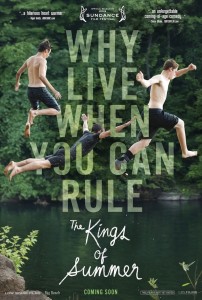The Kings of Summer
Posted on June 6, 2013 at 6:00 pm
 When Mark Twain had Huck Finn leave the kind-hearted widow who hoped to “civilize” him to “light out for the territories,” he tapped into the dream of all teenagers and the teenagers inside all of us to escape from all rules and restrictions and create our lives from scratch. Peter Pan and the Lost Boys had Neverland. Baby boomers sang along with Crosby, Stills, Nash and Young about “trying to get ourselves back to the garden.” Every generation wishes for the simplicity and purity of the natural world. In the wise, touching, and often wildly funny “The Kings of Summer,” three 15-year-olds follow their own call of the wild to run away from home and build a house in the woods. Their parents may see them as boys, but they want a place where they can define what it means to be men.
When Mark Twain had Huck Finn leave the kind-hearted widow who hoped to “civilize” him to “light out for the territories,” he tapped into the dream of all teenagers and the teenagers inside all of us to escape from all rules and restrictions and create our lives from scratch. Peter Pan and the Lost Boys had Neverland. Baby boomers sang along with Crosby, Stills, Nash and Young about “trying to get ourselves back to the garden.” Every generation wishes for the simplicity and purity of the natural world. In the wise, touching, and often wildly funny “The Kings of Summer,” three 15-year-olds follow their own call of the wild to run away from home and build a house in the woods. Their parents may see them as boys, but they want a place where they can define what it means to be men.
Nick Robinson, who perfected a look of exquisite pain at the humiliating behavior of his father in a brilliant series of Cox cable commercials, plays Joe Toy. He lives with his widowed father, Frank (“Parks and Recreation’s” Nick Offerman in a witty and heartfelt performance). Of course at that age, a parent does not have to do anything to be excruciatingly embarrassing. It is bad enough that Frank actually exists, but he also has the nerve to tell Joe what to do. Worse, he is dating someone, and worst of all he expects Joe to play a board game with her. The horror!
Joe’s best friend Patrick (Gabriel Basso), is smoldering with his own adolescent fury. His parents say things like, “Rope in the attitude, mister” and just because his ankle is in a cast, they want him to be careful. How dare they! “I’m happy to be where my parents are not,” he says.
Another kid named simply Biaggio (the wonderfully oddball Moises Arias) wants to join them. He does not have any special problem with his family. He just “didn’t want to do nothing.”
Joe, Patrick, and Biaggio build their house in the woods. They breathe the air of free men and rejoice in their liberation from all rules and conventions. They vow “to boil our own water, kill our own food, build our own shelter, be our own men.” If foraging for food in the woods means a stop by the Boston Market across the highway from the forest, well, no one can argue with how good it tastes.
Director Jordan Vogt-Roberts and writer Chris Galletta bring a fresh and sympathetic eye to the story, evoking the pleasure of what feel — for a little while — like endless possibilities. The film perfectly captures that liminal moment when teenagers live in the space between childhood and becoming an adult. And they’re old enough to carry it off, at first. They are young enough to be certain their parents are wrong about pretty much everything — and to be confident that they can do everything better. The house is like something the Lost Boys might build for Peter Pan, with a stolen door from a port-a-potty for the entrance and essentials like a mailbox, a slide, a basketball hoop, and an air hockey table.As is often the case with boys of 15, they look like they are from three different planets. Patrick is muscular and physically much more mature than the others and Biaggio could be 12. Joe is somewhere in the middle. Biaggio’s random and inscrutable pronouncements are amusingly accepted by the other two as if they made as much sense as anything else, or as if making sense did not matter. And of course the most unexpected complication is when a girl comes through the port-a-potty door.
Like that other icon of the dream of escaping the oppression of civilization, Henry David Thoreau, the boys learn that there is a time to go to the woods, and a time to come home.
Parents should know that this movie has very strong and crude language and teen drinking and smoking.
Family discussion: What was the most important thing Joe learned? What about Frank? What would you bring to a house in the woods?
If you like this, try: “Stand By Me”



